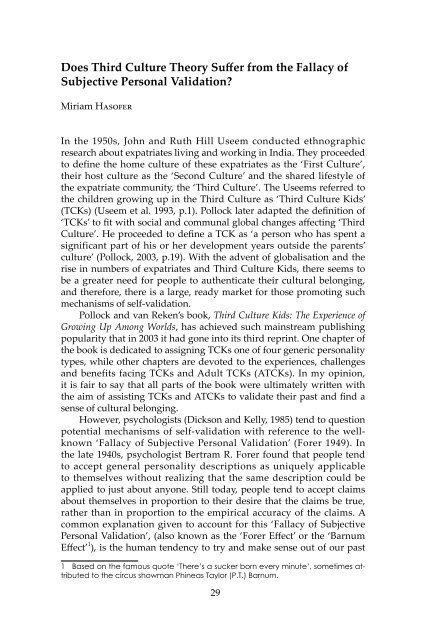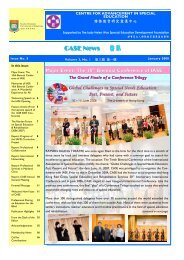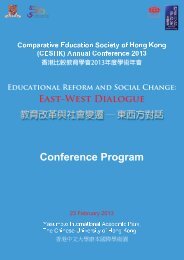Comparative Education Bulletin - Faculty of Education - The ...
Comparative Education Bulletin - Faculty of Education - The ...
Comparative Education Bulletin - Faculty of Education - The ...
You also want an ePaper? Increase the reach of your titles
YUMPU automatically turns print PDFs into web optimized ePapers that Google loves.
Does Third Culture <strong>The</strong>ory Suffer from the Fallacy <strong>of</strong><br />
Subjective Personal Validation?<br />
Miriam Has<strong>of</strong>er<br />
In the 1950s, John and Ruth Hill Useem conducted ethnographic<br />
research about expatriates living and working in India. <strong>The</strong>y proceeded<br />
to define the home culture <strong>of</strong> these expatriates as the ‘First Culture’,<br />
their host culture as the ‘Second Culture’ and the shared lifestyle <strong>of</strong><br />
the expatriate community, the ‘Third Culture’. <strong>The</strong> Useems referred to<br />
the children growing up in the Third Culture as ‘Third Culture Kids’<br />
(TCKs) (Useem et al. 1993, p.1). Pollock later adapted the definition <strong>of</strong><br />
‘TCKs’ to fit with social and communal global changes affecting ‘Third<br />
Culture’. He proceeded to define a TCK as ‘a person who has spent a<br />
significant part <strong>of</strong> his or her development years outside the parents’<br />
culture’ (Pollock, 2003, p.19). With the advent <strong>of</strong> globalisation and the<br />
rise in numbers <strong>of</strong> expatriates and Third Culture Kids, there seems to<br />
be a greater need for people to authenticate their cultural belonging,<br />
and therefore, there is a large, ready market for those promoting such<br />
mechanisms <strong>of</strong> self-validation.<br />
Pollock and van Reken’s book, Third Culture Kids: <strong>The</strong> Experience <strong>of</strong><br />
Growing Up Among Worlds, has achieved such mainstream publishing<br />
popularity that in 2003 it had gone into its third reprint. One chapter <strong>of</strong><br />
the book is dedicated to assigning TCKs one <strong>of</strong> four generic personality<br />
types, while other chapters are devoted to the experiences, challenges<br />
and benefits facing TCKs and Adult TCKs (ATCKs). In my opinion,<br />
it is fair to say that all parts <strong>of</strong> the book were ultimately written with<br />
the aim <strong>of</strong> assisting TCKs and ATCKs to validate their past and find a<br />
sense <strong>of</strong> cultural belonging.<br />
However, psychologists (Dickson and Kelly, 1985) tend to question<br />
potential mechanisms <strong>of</strong> self-validation with reference to the wellknown<br />
‘Fallacy <strong>of</strong> Subjective Personal Validation’ (Forer 1949). In<br />
the late 1940s, psychologist Bertram R. Forer found that people tend<br />
to accept general personality descriptions as uniquely applicable<br />
to themselves without realizing that the same description could be<br />
applied to just about anyone. Still today, people tend to accept claims<br />
about themselves in proportion to their desire that the claims be true,<br />
rather than in proportion to the empirical accuracy <strong>of</strong> the claims. A<br />
common explanation given to account for this ‘Fallacy <strong>of</strong> Subjective<br />
Personal Validation’, (also known as the ‘Forer Effect’ or the ‘Barnum<br />
Effect’ 1 ), is the human tendency to try and make sense out <strong>of</strong> our past<br />
Based on the famous quote ‘<strong>The</strong>re’s a sucker born every minute’, sometimes attributed<br />
to the circus showman Phineas Taylor (P.T.) Barnum.<br />
29
















